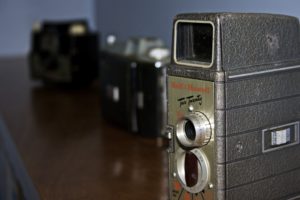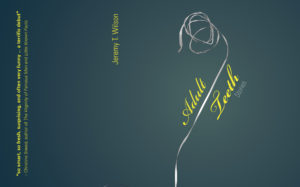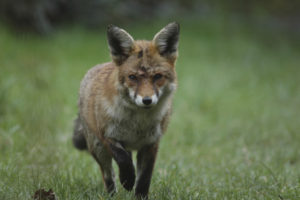Excerpt from In Our Other Lives by Theodore Wheeler
Elisabeth Holland sensed there was bad news the same as she had at other times—she woke early, started coffee, set out her scrubs, waited for the phone to ring—but this morning something was different in the way her internal organs were arranged. The world had shifted underneath her while she was asleep. Elisabeth felt it on the horizon. The sun rising, yes, but also that something vital had changed inside her and out.
This time it was her mother who called to tell the news.
—Did you see?
—See what?
—He’s alive. They found him.
Elisabeth continued fitting the sleeve into the percolator and added three spoons of dry grounds from the canister. The phone was on speaker, on the counter, while her mother rushed to tell what had happened. The call was something Elisabeth must have dreamed about dozens of times, hundreds of times; and it was, she admitted this freely to a woman she worked with at the hospital, that she daydreamed all the time that someone she’d lost would return to her. And in this moment—her mother rambling, repeating the same words, they found him, and Elisabeth unsure who was found and who had done the finding—she questioned if she was woman enough to handle the news she’d so long hoped to hear, or if the news would overwhelm her.
—Is it going to be okay?
—Oh, honey. I don’t know. Sometimes things happen for reasons we can’t understand.
—Don’t say it’s God’s plan. I’ll hang up if you say that.
Elisabeth forgot about the coffee to rush across her apartment and turn on the TV, then she saw. Tyler in a glitching, wavy video, a ten-second clip looped on cable news. The title read: “Missing American Found; Turncoat?” The cable-news anchor verified that the man’s identity had only just then been confirmed by the government and that the man in the video was Tyler Ahls. Elisabeth knew the man in the video was Tyler Ahls. Her kid brother, missing in Pakistan nine months by then, supposedly on a missionary trip. Under a doppa cap and patchy beard, Tyler: the block shape of his head, his stringy ginger hair falling long down the sides of his skull. His gray eyes, his gaze slightly diverted, always, because he was timid.
—It’s Tyler.
—Yes! Tyler!
There would be thousands of questions to ask and answer because of that video of Tyler Ahls in an Afghani cave. But Elisabeth didn’t worry about all that. In this moment of simultaneous joy and dread, Elisabeth felt sorry for herself. She hung up the phone and returned to brewing coffee as the weight of her mysteries puzzled in new design on her shoulders. That she married and lost love young. That she only briefly was a mother before that too escaped her, that her son died, two months old, and she’d lived alone since then. That her brother, her parents—she’d never known what exactly to think about them. She watched the drips drop into the pot, trying to grasp what that video was going to mean for her family, for her parents and for Tyler. If Tyler really was alive, for one thing, and if he could ever come home; and if it would have, in fact, been better if he died hiking, like they believed he had while evangelizing in Pakistan, instead of being in the hands of terrorists; or if he was one of them. (She hadn’t yet seen the ransom video of Tyler, the curious demands he made, so she didn’t understand why the newscasters wondered if he was a turncoat.) Elisabeth struggled to keep her mind on anything. She thought of her husband. Maybe it was wrong of her, but when her mother called and said they found him, Elisabeth thought, she’d hoped, it was her husband who’d been found. Her husband (Nick Holland) who was also missing, for three years by then. Nick ran off on his own volition and nobody was looking for him. Elisabeth didn’t know this at the time (how could she?) but Nick would show up in Omaha not long after this morning.
Once the pot was brewed, she poured herself a cup, stirred in two spoons of sugar, but didn’t sip. The aroma made her gag. She poured the entire pot into the sink, unthinking, washed it away with clean water from the tap, then took a Coke from the fridge because she needed something sweet. She sat at the table and tried to put herself in the right frame of mind to go into the hospital where she was a nurse. She emptied the can in a few swallows. The taste, the sugar, was what she was thirsty for, so she opened a second can.
It was strange to have Nick Holland drop into her mind—when her mother said they found him. What Elisabeth thought of, that moment, was Nick holding their baby. The look on his face, that sly, almost unwitting smile, Nick so pleased with whatever joke he was keeping to himself—because her mother had put his son in a silk baptismal gown, what he’d called a dress. She and Nick lived in a one-bedroom ground-floor in Chicago then. Her dad poking around, an armchair flipped over on its top so he could fix where a spindle unglued out from its joint. Her mom practically pacing, manic, trying to explain the historical significance, the family lore, trying to explain the three generations of the pretty white gown she brought to put on Caleb.
Nick was the one who dressed the baby in the gown, who slid white silk over newborn head and tightened the pleats with a sash. All with Deb Ahls trying to interfere over his shoulder, all without the baby crying.
Elisabeth’s parents, her mother especially, weren’t comfortable with the fact that Nick had no religion. That he was godless, as they called it. Elisabeth even concealed how Nick was never baptized. Of course he was, Elisabeth lied, on the phone to her parents when she called to tell them she’d married Nick. Everybody in Nebraska is baptized, which is where Nick came from. This had to be the reason the Ahls rushed down to Chicago the instant Caleb was born, Elisabeth’s mother clutching the paperboard box that held the silk gown like it was a religious artifact, like it was the Shroud of Turin she dug out of their attic in Wisconsin. Already the Ahls didn’t like Nick—he was eight years older than their daughter; she was only twenty-three when she married him—and his godlessness made this gap harder to stomach. Still, couldn’t they have left that gown in the car?
Nick’s bemusement at the situation delighted Elisabeth. He was quietly perplexed as he listened to Deb Ahls go on about sacraments—baptism, reconciliation, etc., etc. Nick strolled to the window with the baby to look where a guy was trying to tip a Chevy Metro over a snowbank without getting high-centered. City plows had barricaded in all the cars on the block, so Nick watched the sedan rock and its tires sink into the snow as he fingered the pleats and bleached lace that brocaded Caleb’s chest. This was the Nick Holland that Elisabeth loved. Cowboy Nick, tall and lean, with a scuzzy beard. Exhaustion bowed his shoulders, his back, because he returned to the warehouse where he worked only a day after the baby was born. He didn’t have to do that, but that’s how he was—how I was raised, he’d say, to remind Elisabeth that he came from hard workers, farmers, that he’d risen before the sun most every day as a teenager, or so he claimed. Nick, who that day, unbathed in blue jeans and plain white tee, barefoot, at half past noon on a Thursday, woke only because company was at the door. Of course, the baby had disordered his hours—why shouldn’t he sleep when he had the chance?—and in Chicago he always worked nights.
It wasn’t clear to Elisabeth why she remembered Nick this way. His glancing over his shoulder at her, Caleb asleep in his arms all of a sudden. “Well,” he said, looking at Elisabeth but speaking to her mother, “we’re not running out the door right this minute to dunk him in holy water, if that’s what you expect.”
With the same sure hand, Nick slipped Caleb out of the gown and swaddled him in swaddling and set the baby in the bassinet without waking him.
How did a guy like him know how to do a thing like that? Nick claimed he never even held a baby until the OB put Caleb in his arms in the delivery room. Elisabeth’s legs still spread in the stirrups and there’s Nick with his son in his arms; Nick joyous, laughing, hair in his eyes, an infant cradled in his elbow. Was that a natural component of the cogs that made Nick Holland tick? Dusty good looks, a strong mind for trivial knowledge, a soft and assured touch with infants? And if this was so, this last component, then why did Nick run off and leave her and the baby so soon after that day?
**
Theodore Wheeler is author of the novels In Our Other Lives (Little A, 2020) and Kings of Broken Things (Little A, 2017). Winner of a 2020 National Endowment for the Arts Creative Writing Fellowship, he covers a civil-law and politics beat for a national news service, co-directs Omaha Lit Fest, and sidelines as a bookseller for the Dundee Book Company roving book cart, one of the world’s smallest bookstores.
**
Music by Catlofe







